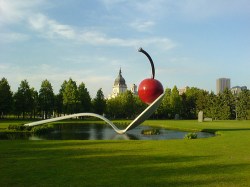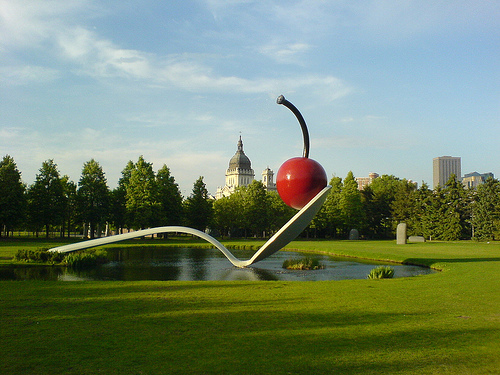At Grist, we love Parks and Recreation. The show is brilliant and funny — and we especially admire protagonist Lesley Knope. As played by Amy Poehler, the wonderfully multidimensional Knope makes mistakes, but in the end she always manages to pull the Parks Department together to get the job done. And no one loves her hilarious, flawed city more than she does.
In fact, the way we see it, we could all use a little more Knope in our cities. So over the next few months, we will introduce you to the real-life Lesley Knopes of the world: the female city officials who work hard to make their cities more sustainable. Even if Parks and Recreation isn’t your speed, you’ll get a fresh look at the women on the ground fighting to implement real change in our urban environments.

Gayle Prest: “It’s OK to be nice.”
Episode 1 features an edited conversation with Gayle Prest, sustainability director for the city of Minneapolis.
Prest passes the Knope test in two big ways. First, she loves her city. (Sample question: “Are you a big fan of cities?” Answer: “I love Minneapolis. I really love Minneapolis. Have you ever been here?”) Second, she’s incredibly friendly. (She offered me a personal tour of the city within the first five minutes of our call and ended the chat with, “and for crying out loud, get your butt out here.”)
While this butt has still not been to Minneapolis, the Minnesota native made the city sound awfully alluring. Prest, who has been with the Minneapolis sustainability office since 2006, told me why sustainability directors across the nation are working together, how Minnesota provides a unique approach to urban sustainability, and why the City of Lakes is just so darn lovable.
Q. What’s your department like?
A. Our sustainability office is quite small. It’s two people and an intern and what we try to do is drive change throughout the city. So we do a lot of work on helping different departments do their job. Right now we’re undertaking a new climate action plan. The last one we did was in the 1990s. We’ve been documenting our greenhouse gas emission reductions and we can document a 13 percent decrease in our greenhouse gas emissions community-wide from 2006 to 2010.
Q. What is your big struggle right now?
A. Fighting Asian carp. These stupid fish have traveled up the Mississippi and they are now in Minnesota. If they get by Minneapolis, they will get in Lake Superior. This is the last stand. We have an opportunity here with a lock and dam to stop ’em, so we’ve got to do it, right? We are working with state agencies and federal agencies and Congress. We’re trying to make people understand that this is timeliness. Everyone’s at such a slow pace — how do you light the fires and say “10 lousy fish above us and it’s all for naught?”
Q. You’ve also been doing a lot with urban farming, right?
A. We’re doing some phenomenal work on urban agriculture. We have a new food council. It’s a hybrid model that hasn’t been tried anywhere in the country. We did four years of good food policy preparations and stakeholder groups and even workforces. Before we institutionalized it, we wanted to understand the community and the issues. Now we have a hybrid model with city staff, elected officials, and the community all on the council together. We’re the breadbasket of the United States, so we can grow stuff, darn it. We have over 150 community gardens.
We just went through a big deal this year updating our zoning regulations as it relates to urban agriculture. We spent a lot of time looking at how Baltimore, Portland, Seattle, San Francisco, Chicago have done it.
We’re trying to get bees on our green roof on city hall next year. I think you should come up for part of your good journalistic work.
Q. Do a little muckracking. Make sure those hives are really up.
A. Exactly.
Q. You’ve also pushed bicycling — but you’ve said that you won’t use photos of anyone in Spandex in bike promotional materials.
A. Doesn’t that make sense? We try to have people of all shapes and sizes and all sorts of different types of bikes and just normal people. People laugh — our bike share program is called “Nice Ride.” In Minnesota we have what’s called “Minnesota nice” where you try to be polite and nice to everybody. But you can also say, “Oh, nice ride.” It’s very accessible. Not a crazy ride, not an adrenaline rush ride, but a nice ride.
Q. I like that.

A Minneapolis park. (Photo by theopie.)
A. [Laughs.] It’s OK to be nice. One of the ways you get sustainability into the DNA of the city is to make it very accessible to everybody. That’s what’s so neat about urban ag — the idea that everybody can either belong to a community garden or start up tomato plants in your backyard, learn how to can. We reach out to all different languages, all different health issues, economic disparity issues. It’s a great way to build community and reduce crime.
Q. Has there been pushback on any of your projects?
A. You can talk to me next week about that. [Laughs.] So far our climate action plan has been moving along well. We try to engage all stakeholders, but with all climate action plans, it’s pretty ambitious. We are going to look at subcommittee recommendations and hopefully have enough consensus to get that to the council by the end of the year.
When it comes to sustainability, it’s always a negotiation. Different players always want to see something different. You’re never going to reach 100 percent consensus on anything. How do you weigh the challenges, opportunities, benefits, and cons to come up with a solution?
Q. Have people gotten not-so-nice about Nice Ride in the past?
A. No. That is a beloved institution.
Q. For all this talk about being nice, there’s some competition between cities over who is going to be the greenest. When Minneapolis took the title of “most bike-friendly city in America” away from Portland, Ore., in 2010, your mayor was quoted as saying, “Portland is just an avenue in Minneapolis.”
A. You didn’t hear that from me, did you? I think I know where you’re going with this. What’s so fun about sustainability directors is that we all know we can learn from each other. While there’s this competition, it’s healthy. It’s not mean. We’re all making it up as we go along. This is such a unique opportunity to systematize sustainability and keep it in front of elected officials’ and the community’s eyes. We want everyone to succeed because it keeps us all on our toes and moving.



